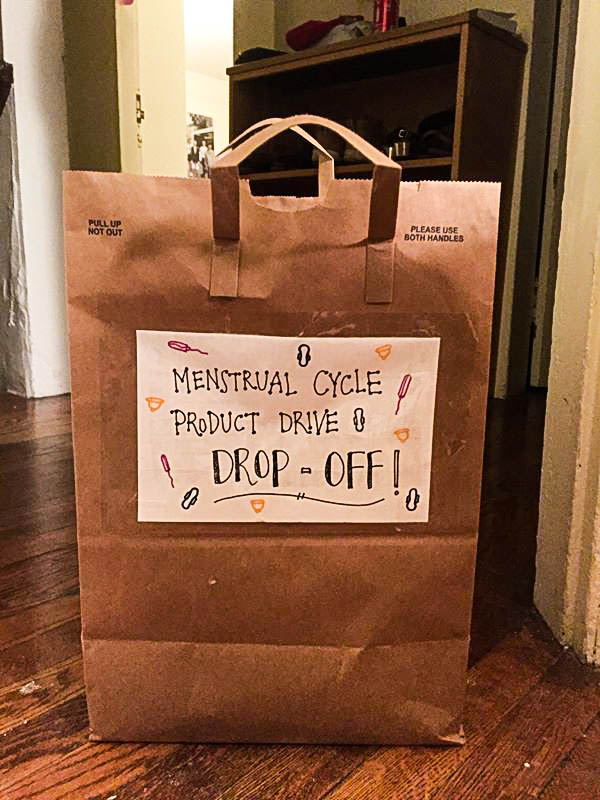
Beginning on March 28 and continuing throughout the month of April, several groups on campus are sponsoring a Menstrual Cycle Product Drive to collect donations for members of the Middletown homeless community who may not have access to these types of products. Sponsors include Womanist House, Women of Color House, Community Engagement House, International House, Sign Language House, The Bayit, Asian/Asian American House, Women of Color Collective, Adolescent Sexual Health Awareness (ASHA), The Wesleyan Doula Project, the Planned Parenthood Chapter, Rho Epsilon Pi, and Wesleyan Advocates for Gender Equality (WAGE).
“We want your tampons! diva cups! pads of all shapes and sizes!” the Facebook event reads. “Many homeless folks do not have access to menstrual cycle products, especially because of cost. Join us in collecting as many products as we can to donate to the Middletown homeless community.”
One of the organizers of the drive and House Manager of Womanist House Michele Ko ’16 explained that the drive started off as a ResLife program, a collaborative effort between the house managers of several program houses around campus. Having all been working on the same staff, they wanted to facilitate a program that would bring their communities together. Once the drive was established, other groups on campus, specifically those centered on women’s health, came on board.
Ko commented on how she and the other organizers came to the decision that the drive should be directed at the larger Middletown community.
“I think…we wanted to donate [the products] to the Middletown homeless community because we felt like a lot of drives [being] organized on campus are very Welseyan-specific,” Ko said. “I think we need to bridge more connections between the two communities.”
Lily Kong ’16, one of the co-coordinators of ASHA, was approached by Ko to co-sponsor the drive.
“I think we tend not to think about homelessness and menstruation together and how they affect each other, and I know it’s something that never really crossed my mind before [Ko] approached us, but the drive really says something about how things intersect in a way that creates a lot of social issues that one would never really expect or think about immediately,” Kong wrote in an email to The Argus.
The organizers, led by the House Manager of Community Engagement House Isabel Bartholomew ’18, are working directly with groups like Community Renewal Team (CRT) based in Hartford, and St. Vincent de Paul in Middletown. CRT offers childcare, education, and treatment services to residents of Central Connecticut. St. Vincent’s also offers support services such as these, but is more directly involved in providing food, as they run a community soup kitchen and a food pantry.
Another way the drive is garnering support is through the application Venmo, through which individuals can electronically donate money directly from their bank accounts. Students can contribute in this way by looking up the profile @MCProductDrive on the app itself. Ko noted that this has been a popular way for students to get involved thus far.
Another possibility the organizers are considering is to go through University establishments like Weshop and Usdan for additional student support.
“We’re in the process of figuring out how folks can donate points to the drive,” Ko said. “So they could swipe their points, and we could use those points to buy more products for people…that we’re still working out, [but] I think it would be a good new direction for us.”
At the end of the drive, the organizers plan to throw a final, celebratory event. Ideally, it would be held outside and would be a space for body and sex positivity featuring games, prizes, and refreshments. Though the event itself is still in the early planning stages, the organizers hope it can be a place for the University and the rest of Middletown to come together as one community.
Ko commented on how body and sex positivity will come into play during the event.
“I think a big part of it is celebrating the menstrual cycle,” Ko said. “I think it’s really silenced. People don’t talk about it…but this happens to our bodies, there’s nothing wrong with it, it’s a beautiful thing…we should be celebrating our bodies, not be ashamed [of them].”
Products can be dropped off at the designated donation bins around campus, which are located at Womanist House (44 Brainerd), Women of Color House (227 Pine), Community Engagement House (28 Lawn), International House (151 Church), Sign Language House (64 Lawn), 72A Home, 264 Court, and 34 Fountain. There will also be tables set up in Usdan later this month where students can bring additional goods or donate money. Many contributions have already been made, but the organizers anticipate that these numbers will significantly increase toward the end of the year when most students are getting ready to leave campus.
“The drive is a great way to actively help out, but also starts a conversation about such social issues, which is why I think it’s such a great idea,” Kong wrote.
Ko shared some final thoughts on what this drive means to her and how people are motivated to get involved in initiatives in which they feel a real difference is being made.
“There’s something really cool about doing something…where you know there are 30 or 40 pads in your bin right now, and [they’re] going to go to another person who’s really going to need them,” Ko said. “I think that sort of concreteness is what’s drawn a lot of people to the drive.”


Leave a Reply